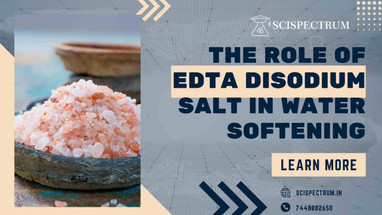Posted by Scispectrum on 22nd Aug 2025
EDTA Disodium Salt: The Unsung Hero of Softer, Cleaner Water
EDTA Disodium Salt: The Unsung Hero of Softer, Cleaner Water
Hard water, a common household nuisance, leaves behind stubborn limescale buildup, dulls laundry, and even affects the taste of your morning coffee. While traditional water softeners rely on ion exchange, a lesser-known but equally effective method utilizes EDTA disodium salt. This article delves into the science behind EDTA disodium salt and its role in combating hard water woes.
Understanding Hard Water and its Challenges
Hard water contains high concentrations of dissolved minerals, primarily calcium and magnesium ions. While generally safe to drink, these minerals wreak havoc on plumbing, appliances, and even our skin and hair.
Here’s how:
- Limescale Buildup: Calcium and magnesium ions precipitate out of hard water, forming a chalky deposit called limescale on faucets, showerheads, pipes, and heating elements. This buildup reduces water flow, decreases appliance efficiency, and can eventually lead to costly repairs.
- Laundry Problems: Hard water inhibits the lathering action of soaps and detergents, leading to soap scum buildup on fabrics, making them feel stiff and scratchy. It can also dull colors and leave white residues on clothes.
- Skin and Hair Issues: Hard water can dry out skin and hair, leaving them feeling itchy and irritated. It can also exacerbate existing skin conditions like eczema.
EDTA Disodium Salt: A Chemical Solution to a Mineral Problem
EDTA disodium salt, also known as EDTA Na2 or disodium EDTA, is a synthetic amino acid with a remarkable ability to bind to metal ions, including calcium and magnesium. This process, known as chelation, forms a stable, water-soluble complex that prevents these minerals from reacting and forming limescale.
Unlike ion-exchange water softeners that replace calcium and magnesium ions with sodium ions, EDTA disodium salt simply binds to them, effectively neutralizing their ability to cause hardness. This makes it an ideal solution for those on sodium-restricted diets or concerned about the environmental impact of salt discharge from traditional softeners.
Applications of EDTA Disodium Salt in Water Softening
EDTA disodium salt’s versatility extends to various applications:
- Laundry Detergents: Many laundry detergents incorporate EDTA disodium salt to enhance cleaning power. It softens the water, allowing detergents to lather better and prevent soap scum from depositing on clothes.
- Industrial Boilers and Cooling Towers: Hard water is a significant concern in industrial settings. EDTA disodium salt prevents limescale buildup in boilers and cooling towers, ensuring their efficient operation and prolonging their lifespan.
- Other Applications: EDTA disodium salt is also used in various other applications, including:
- Food preservation: It acts as a preservative by binding to metal ions that can catalyze oxidation and spoilage.
- Personal care products: It’s found in shampoos, soaps, and lotions to enhance lathering and prevent soap scum formation.
Benefits of Using EDTA Disodium Salt for Water Softening
- Effective Limescale Prevention: EDTA disodium salt effectively prevents limescale buildup, protecting appliances, pipes, and fixtures from damage.
- Improved Detergent Efficiency: It enhances the performance of soaps and detergents, leading to cleaner laundry and reduced soap scum.
- Sodium-Free Solution: Unlike ion-exchange softeners, it doesn’t add sodium to the water, making it suitable for those on sodium-restricted diets.
- Environmentally Friendly: It’s generally considered more environmentally friendly than salt-based softeners, as it doesn’t contribute to salt discharge into the environment.
Considerations and Potential Drawbacks
While generally safe for most applications, there are some considerations:
- Dosage: Using the correct dosage is crucial for effective water softening and to avoid potential negative effects.
- Biodegradability: EDTA disodium salt has limited biodegradability, raising concerns about its accumulation in the environment. However, newer formulations with improved biodegradability are being developed.
- Heavy Metal Chelation: While beneficial for removing hardness minerals, EDTA can also bind to heavy metals, potentially mobilizing them in plumbing systems if present.
Conclusion: A Powerful Ally in the Fight Against Hard Water
EDTA disodium salt offers a compelling alternative to traditional water softening methods, effectively combating hard water issues and providing a range of benefits. Its ability to prevent limescale buildup, enhance cleaning power, and offer a sodium-free solution makes it a valuable tool for both residential and industrial applications.
As with any chemical treatment, responsible use and awareness of potential drawbacks are essential. Consulting with a water treatment professional can help determine if EDTA disodium salt is the right solution for your specific needs and ensure its safe and effective application.

